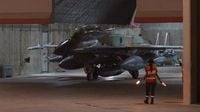In a significant escalation of regional tensions, the Israeli Defense Forces (IDF) launched extensive airstrikes overnight Sunday into Monday, targeting Houthi-controlled areas of Yemen. This marked Israel's first military action in Yemen in nearly a month, striking three key ports—Hodeidah, Ras Isa, and Salif—as well as the Ras Khatib power plant along the Red Sea coast. The operation, dubbed "Black Flag," also targeted the Galaxy Leader, a cargo ship seized by the Houthis in November 2023.
The IDF justified the strikes as a response to repeated missile and drone attacks launched by the Iran-backed Houthi movement against Israeli territory. According to the Israeli military, these ports and the power plant were being used by the Houthis to transfer weapons from Iran and to support terrorist activities. Notably, the Galaxy Leader, a Bahamas-flagged vessel, had been retrofitted with a radar system by Houthi forces to monitor international maritime traffic, facilitating further hostile operations in the Red Sea corridor.
Approximately 20 Israeli fighter jets participated in the operation, dropping over 50 munitions on the designated targets. Prior to the strikes, the IDF’s Arabic-language spokesman, Avichay Adraee, issued urgent evacuation warnings for residents near the ports and power station. Following the strikes, reports indicated that the power station at Hodeidah was knocked out, plunging the city into darkness, though there were no immediate reports of casualties.
In retaliation, the Houthis launched two ballistic missiles toward Israel hours after the Israeli airstrikes. Sirens sounded in several southern West Bank settlements, but no injuries or damage were reported. The Israeli military attempted to intercept the missiles, with results under review. Houthi military spokesman Yahya Sarea claimed responsibility for the missile and drone attacks, declaring a joint operation targeting strategic sites in Israel, including Ben Gurion airport, the ports of Ashdod and Eilat, and a power station in Ashkelon. He asserted that their air defenses had successfully confronted the Israeli assault using a barrage of domestically produced surface-to-air missiles.
The conflict between Israel and the Houthis has intensified since the outbreak of the Israel-Hamas war in Gaza in October 2023. The Houthis, who control much of northwestern Yemen including the capital Sanaa, have fired hundreds of missiles at Israel and carried out over 100 attacks on commercial vessels in the Red Sea corridor, actions they frame as solidarity with Palestinians in Gaza. The group’s military capabilities have grown substantially under leader Abdul Malik al-Houthi, with tens of thousands of fighters and a growing arsenal of ballistic missiles and armed drones, reportedly supplied by Iran, though Tehran denies direct involvement.
One of the most striking elements of this ongoing conflict is the targeting of maritime vessels. In a recent incident on July 6, 2025, the Liberian-flagged bulk carrier Magic Seas was attacked in the Red Sea near Hodeidah. The vessel was hit by missiles, armored drone boats, and gunfire, leading to a fire and forcing its 19 crew members and three armed guards to abandon ship. The United Arab Emirates coordinated a rescue operation, ensuring all crew were safely evacuated. The Houthis claimed the attack was a response to the ship owner’s alleged repeated violations of a ban on entry into Israeli ports, which they refer to as "occupied Palestine." However, representatives from Stem Shipping, the commercial manager of the Magic Seas, clarified that the ship was carrying iron and fertilizers from China to Turkey and had no current connection to Israel.
Similarly, the Galaxy Leader cargo ship, seized by the Houthis in November 2023, has been a focal point of Israeli military concern. The crew of 25, hailing from the Philippines, Bulgaria, Romania, Ukraine, and Mexico, were held hostage until January 2025, when they were released as part of a ceasefire deal between Israel and Hamas earlier that year. The IDF alleges the Houthis installed radar systems on the ship to track vessels for their operations, underscoring the strategic importance of maritime control in this conflict.
Israeli Defense Minister Israel Katz has been vocal in his warnings to the Houthis, stating, "The Houthis will continue to pay a heavy price for their actions." He further emphasized, "The fate of Yemen is the same as the fate of Tehran. Anyone who tries to harm Israel will be harmed, and anyone who raises a hand against Israel will have their hand cut off." These remarks underscore Israel’s determination to respond decisively to threats from all fronts.
The Houthis, for their part, have maintained that their strikes are in retaliation for Israeli aggression and in support of the Palestinian cause. A Houthi political bureau member, Mohammed Al Farah, condemned the Israeli attacks on civilian infrastructure, describing them as attempts to harm civilians rather than legitimate military targets.
The conflict’s maritime dimension has significant implications for global trade, given the strategic importance of the Red Sea corridor. The Houthis have disrupted shipping routes by attacking vessels they accuse of associating with Israel, complicating international efforts to maintain safe passage through these waters.
Meanwhile, diplomatic efforts continue amid this volatile backdrop. Israel and Hamas are engaged in ceasefire negotiations in Doha, Qatar, aiming to pause military actions in Gaza and secure the release of hostages. Concurrently, Israeli Prime Minister Benjamin Netanyahu is scheduled to meet with former U.S. President Donald Trump at the White House, highlighting the international attention focused on the region's stability.
This latest round of strikes and counterstrikes between Israel and the Houthis reflects the complex and multi-layered nature of Middle Eastern conflicts, where local, regional, and international actors intersect. As Israel continues to confront threats from Iran-backed groups, the risk of broader escalation remains palpable, underscoring the fragile state of peace efforts in the region.





